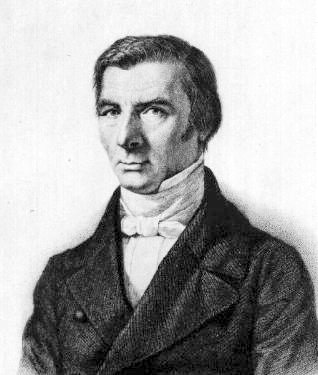Frédéric Bastiat
Claude Frédéric Bastiat (June 30, 1801–December 24, 1850) was a French classical liberal author and political economist.
Biography
He was born in Bayonne, Aquitaine, France. His public career as an economist began only in 1844, and was cut short by his untimely death in 1850. Bastiat had caught tuberculosis, probably during his tours throughout France to promote libertarian ideas, and that illness eventually prevented him from making further speeches (particularly at the legislative assembly to which he was elected in 1848 and 1849) and took his life. Frédéric Bastiat died in Rome, Italy on December 24, 1850.
Views
Bastiat embodied the "Harmonic" school of libertarians, who consider utilitarian and natural law arguments as two complementary aspects of a same world. Bastiat did not take part in the anarchist-minarchist debate (he arguably died too early for that); he seems to have considered the State as something inevitable as far as immediate practical things matter, something that ought to be taken into account as long as it existed. He also explicitly deplored violent revolution as a way to get rid of governments. Finally, his friend Gustave de Molinari did publish his foundational work on free market anarchism in 1849, and Bastiat, knowing that, did declare on his death bed that Molinari was his spiritual heir.
One of Bastiat's most important contributions to the field of economics was his admonition to the effect that good economic decisions can only be made by taking into account the "full picture." That is, economic truths should be arrived at by observing not only the immediate consequences (i.e., benefits or liabilities) of an economic decision, but also by examining the long-term consequences. Additionally, one must examine the decision's effect not only on a single group of people (say candlemakers) or a single industry (say candles), but on all people and all industries in the society as a whole. As Bastiat famously put it: an economist must take into account "both what is seen and what is not seen." Bastiat's "rule" was later expounded by Henry Hazlitt in his work Economics in One Lesson, in which Hazlitt borrowed Bastiat's trenchant "Broken Window Fallacy" and went on to demonstrate how it applies to a wide variety of economic falsehoods.
Because of his stress on the role of consumer demand in initiating economic progress, Bastiat is seen as a forerunner of the Austrian School.
Works
Bastiat was the author of the satirical document best known as the "Candlemakers' petition" which presents itself as a petition from candle-makers to the French government to block out the Sun to prevent its unfair competition with their products. Bastiat was also the author of The Law, originally published as a pamphlet in 1850.
See also
- His debate with Proudhon
- His parable of the broken window
- Liberalism
- Contributions to liberal theory
External links
Template:Wikiquote Template:Wikisource author Template:Commonscat
- Template:Gutenberg author
- Mondo Politico Library's presentation of Frederic Bastiat's book, The Law (Dean Russell translation; full text; formatted for easy on-screen reading)
- FreeAudio.org's free audio book of The Law.
- The Library of Economics and Liberty publishes most English translations of his works.
- Bastiat.org publishes or indexes all about Bastiat.
- The Cercle Frederic Bastiat also publishes about Bastiat, and promotes the same tradition of libertarianism.
- The Candlemakers' Petition - English translation
- The Candlemakers' Petition - Audio Book at FreeAudio.org
- Biography with Literature index
- Frederic Bastiat Explains It All! from FreeEnterpriseLand.com
de:Frédéric Bastiat eo:Frédéric BASTIAT fr:Frédéric Bastiat fi:Frederic Bastiat pl:Frédéric Bastiat sv:Frédéric Bastiat
